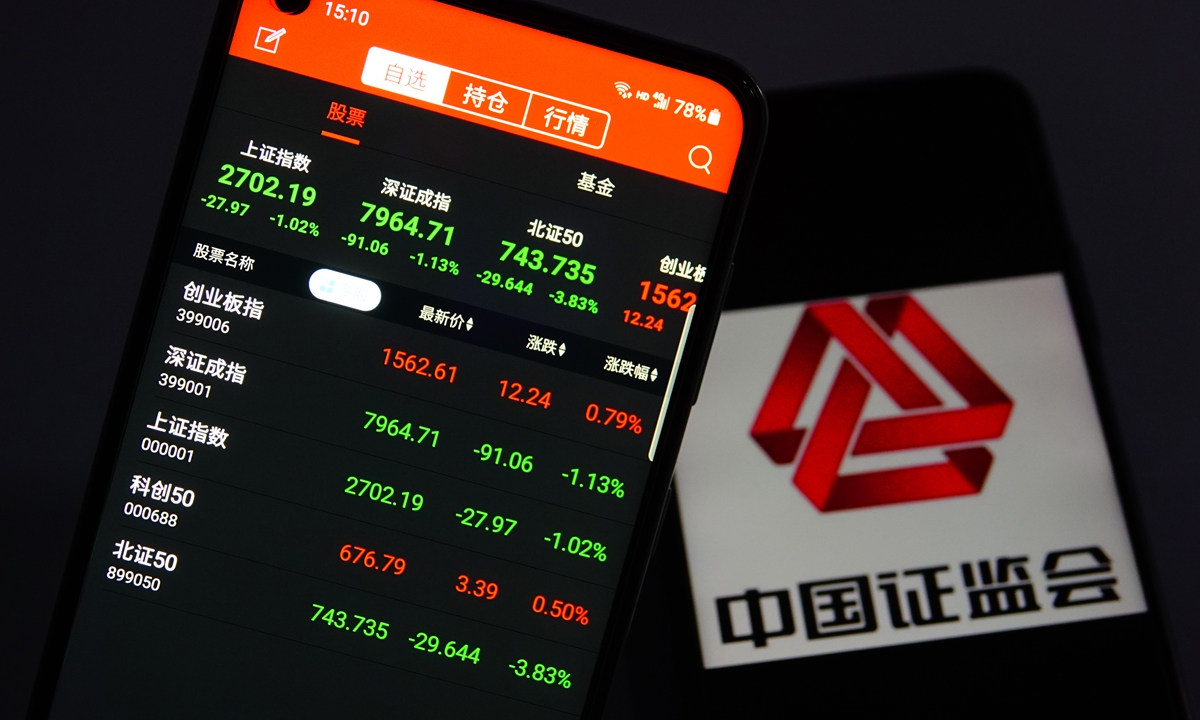
Photo: VCG
The China Securities Regulatory Commission (CSRC) vowed on Monday to strictly punish market manipulation and malicious short selling, in a bid to promote the healthy and stable development of the Chinese stock market.
The commission noted that it will insist on rapid responses, resolute investigations and handling of illegal acts that affect the stable operation of the stock market and jeopardize the legitimate rights and interests of investors.
The Shanghai Composite Index closed above the benchmark level of 2,700 points on Monday after the A-share market made a V-shaped reversal in afternoon trading.
The three major indexes rebounded in afternoon trading. The ChiNext Index turned positive and rose more than 3 percent on the news, while the Shenzhen Component Index and the Shanghai Composite Index also temporarily turned positive.
At the close, the Shanghai Composite Index was down 1.02 percent to 2,702.19 points, the Shenzhen Component Index was down 1.13 percent to 7,964.71 points, and the ChiNext Index was up 0.79 percent to 1, 562.61 points.
The CSRC said on the same day that it would closely monitor risks from pledged stocks and take targeted forceful measures to prevent such risks. Pledged shares are used by major shareholders as collateral to obtain capital from financial institutions for various purposes.
The commission said it will guide brokerages and other financial institutions to increase the flexibility of the margin call lines and promote the smooth operation of the market.
The CSRC also said the proportion of pledged shares by value had fallen from 10.51 percent of the total market capitalization at the peak in 2018 to 3.38 percent as of February 2.
According to data from the Shanghai and Shenzhen stock markets, the total amount of stock pledge default forced liquidations this year hit 27.4032 million yuan ($3.85 million), which accounts for a very small proportion of daily market turnover, the CSRC said.
A spokesperson for the securities regulator said late on Monday that overall risks from margin trading are controllable. The amount of positions closed out due to failures in meeting margin calls has totaled about 900 million yuan since last month, accounting for 0.06 percent of margin loans.
The regulator will continue to strengthen daily oversight of margin trades and take effective measures to ensure stable margin trading operations, the spokesperson noted.
The remark came as a timely response to ease investors' concerns that stock pledge defaults could evolve into a large-scale liquidation, triggering a market downturn, Xi Junyang, a professor at the Shanghai University of Finance and Economics, told the Global Times on Monday.
The market rebound on Monday comes as a great boost to investor confidence, Yang Delong, chief economist at Shenzhen-based First Seafront Fund Management Co, told the Global Times on Monday.
"It is of great significance to reverse the downward trend through policy support, preventing margin calls and panic selling," Yang said.
The CSRC has vowed to stabilize the market through intensive moves.
On Sunday, the CSRC held a meeting where it stressed the importance of carrying out on-site visits to listed companies and solving problems that hinder their high-quality development.
Also on Sunday, the CSRC said that it would severely crack down on major illegal activities such as market manipulation, malicious short selling, insider trading and fraudulent issuance in accordance with the law.
The CSRC on January 28 said that it would suspend lending of restricted shares to strengthen the supervision of short selling.
The Chinese stock market has been experiencing short-term volatility in recent weeks, which sparked some bearish sentiment about the economy. However, Chinese economists have said that the decline was temporary and didn't reflect China's long-term economic fundamentals, and that positive factors outweigh negative ones.
The decline in the stock market is in contrast to China's economic situation, Mei Xinyu, a research fellow at the Chinese Academy of International Trade and Economic Cooperation, told the Global Times on Monday.
"We can see that China is actively stabilizing the property market and addressing local debt issues, while the shift in US monetary policy and expected rate cuts by the Federal Reserve are positive factors for the future of the Chinese stock market," Mei said.
Xi said that the current volatility is only a short-term phenomenon and the Chinese stock market is clearly undervalued.
Experts called for more support at the state level to boost confidence in the market.
Xi suggested implementing measures such as temporarily halting IPOs and encouraging share buybacks by listed companies to increase demand.
It is necessary to take decisive measures and establish a large-scale stabilization fund to halt the market's downturn and provide clear expectations, Yang said.
Yang also suggested that the central bank provide more substantial liquidity support to the market.
China's central bank has announced a cut in the reserve requirement ratio for all banks of 50 basis points from Monday, providing the market with approximately 1 trillion yuan of long-term liquidity.




